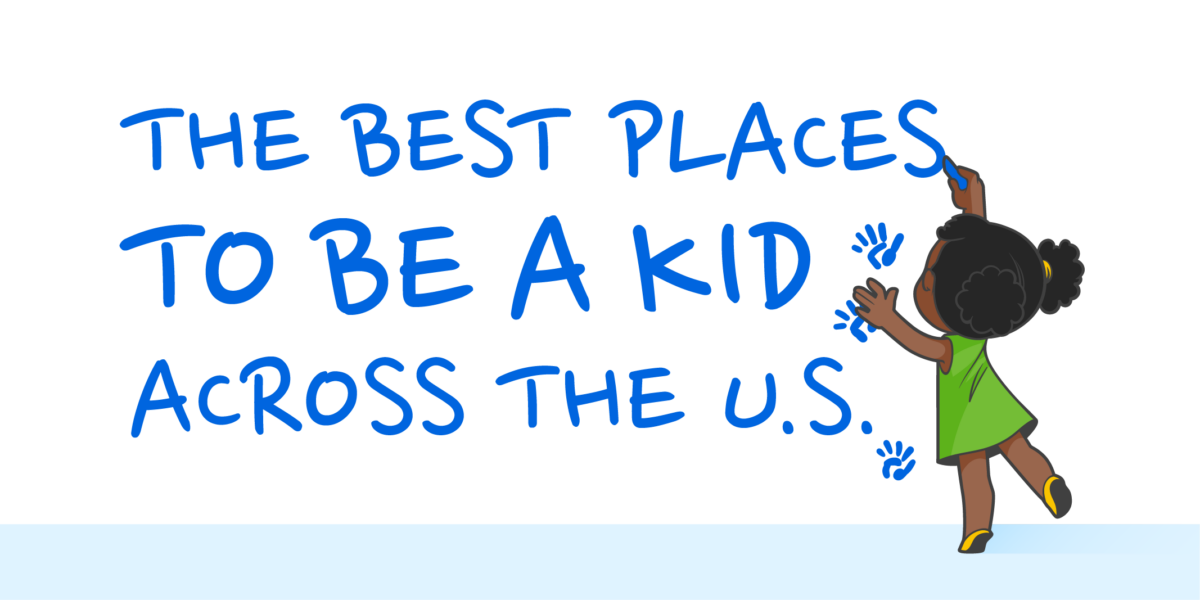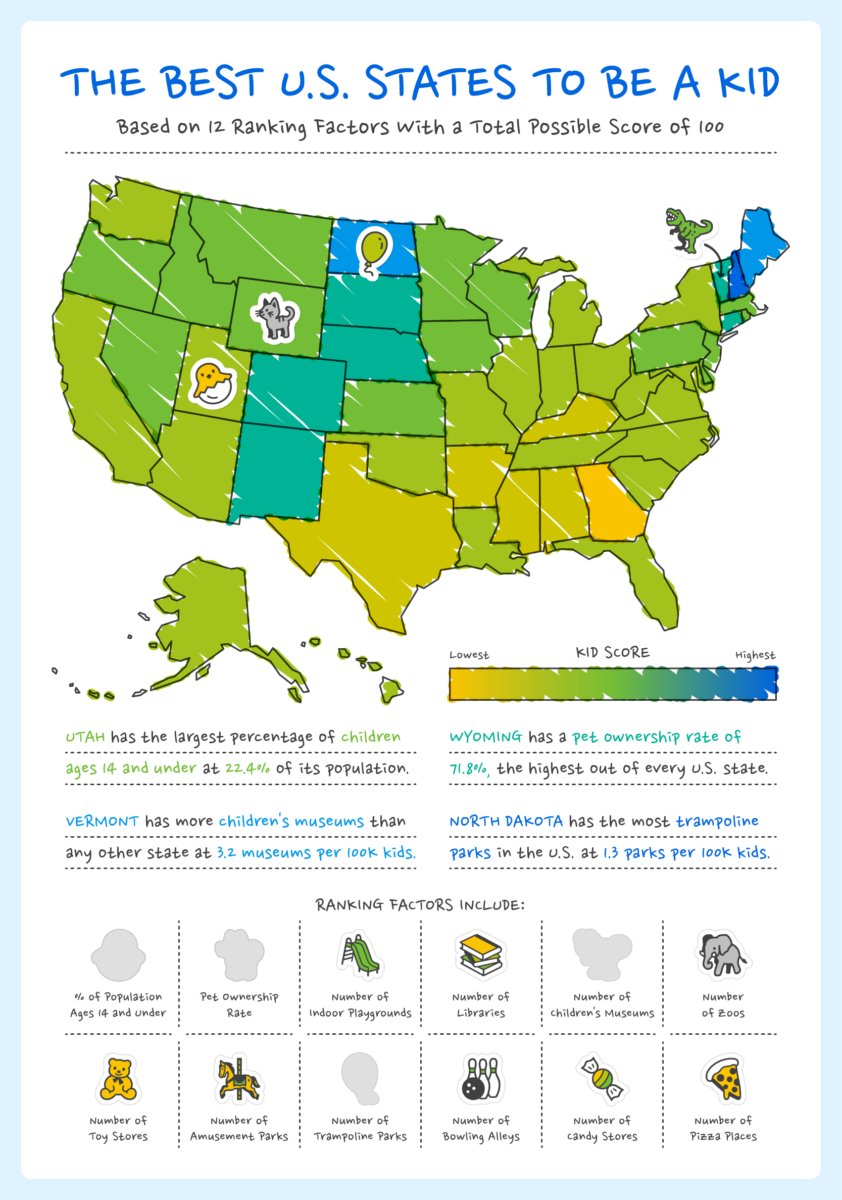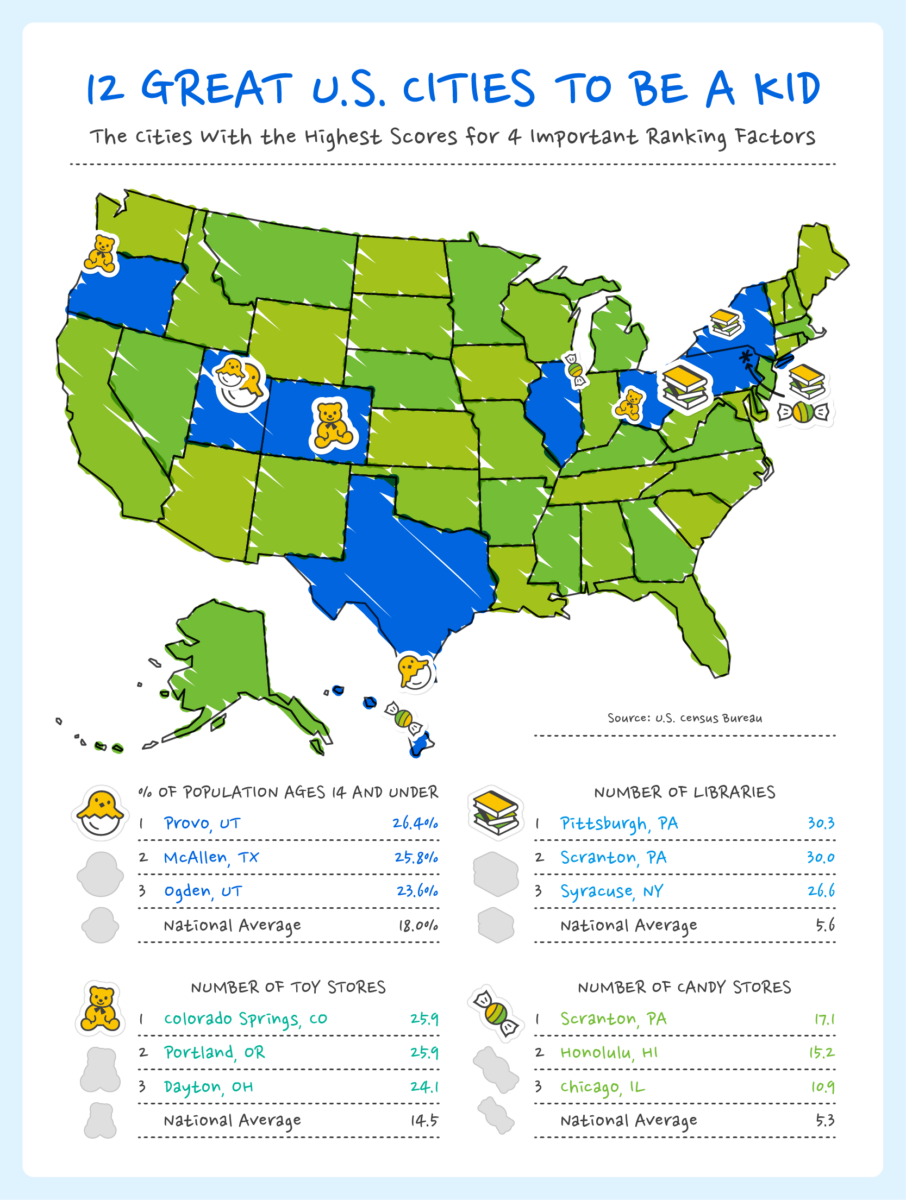The Best U.S. States To Be a Kid

If you were to ask a child what’s most important to them in a place to live, you would probably get answers about being near toy stores or pizza places. If you asked their parents, you might hear more about living closer to libraries and museums. As educators, we know how important striking the right balance between play and education can be.
That’s why Age of Learning commissioned a survey that takes into consideration the criteria that both parents and children have for determining the best places to live. The survey indexes the states by combining several data points to encompass both the fun and educational parts of growing up. Continue reading to find out the best states to be a kid.

Image source: 2024 Age of Learning Commissioned Survey
Based on the reasoning above, it’s time to take a closer look at the parts of the country where kids can have the most fun while learning all about their surroundings and themselves.
1. New Hampshire
New Hampshire earned the coveted spot as the number one state to be a kid with an impressive score of 80.2 out of 100.
- 4.5 zoos per 100K kids
- 2.5 amusement parks per 100K kids
- 10.5 libraries per 100K kids
What sets it apart is its abundance of fun things for young people to do, boasting the most amusement parks per child in the study. These day-long adventures provide young children with interactive opportunities to learn while having fun.
2. Maine
Maine ranks second with a score of 73.6.
- 12.5 candy stores per 100K kids
- 22.9 toy stores per 100K kids
- 63.5 pet ownership rate
Creativity and sensory exploration are paramount for young residents in Maine, with its large proportion of candy and toy stores per capita, ensuring that there’s never a long wait for sweet treats or new toys to explore.
3. North Dakota
North Dakota claims the third spot with a score of 68.8
- 1.3 trampoline parks per 100K kids
- 3.3 zoos per 100K kids
- 4 indoor playgrounds per 100K kids
The Flickertail State ranks so high thanks in part to having the most trampoline parks per capita of any state. Additionally, North Dakota ranks in the top five for zoos per kid, offering ample opportunities for hands-on learning and wildlife exploration.
4. Vermont
Vermont secures the fourth position with a score of 63.2
- 3.2 children’s museums per 100K kids
- 70% pet ownership rate
- 22.7 toy stores per 100K kids
Vermont boasts both the highest number of children’s museums per 100K kids and the highest pet ownership rate in the study. The state provides its young residents with ample interactive learning options and early opportunities to learn the importance of responsibility.
5. South Dakota
Rounding out the top five is South Dakota, with a score of 62.2
- 1.1 amusement parks per 100K kids
- 16.5 pizza places per 100K people
- 2.8 zoos per 100K kids
The Mount Rushmore State gives parents and children plenty of places to have some family fun with kid-approved dining experiences.
More Great States For Kids
While all states have unique qualities and experiences to offer, there are a few that stand out in different aspects when it comes to being a kid. Some states might give young residents great opportunities to visit educational resources like zoos and children’s museums, while others have a variety of fun activities for kids.
Children’s Museums
- Vermont: 3.2 children’s museums per 100K kids
- Alaska: 2
- Maine: 2
- National average: 0.9
Toy Stores
- New Hampshire: 25.8 toy stores per 100K kids
- Oregon: 24.5
- Maine: 22.9
- National average: 15.1
Candy Stores
- New Hampshire: 13.4 candy stores per 100K kids
- Maine: 12.5
- Hawaii: 12.1
- National average: 5.5
Pizza Places
- Rhode Island – 37.3 pizza places 100K people
- Connecticut – 36.8
- Pennsylvania – 36.2
- National average: 24.9
Bowling Alleys
- New Hampshire: 25.8 bowling alleys per 100K kids
- Oregon: 24.5
- Maine: 22.9
- National average: 15.1
While this data highlights states that may appeal to young residents, the survey results also reflect cities that kids across the country could be happy to call home.
The Best U.S. Cities for Kids

Image source: 2024 Age of Learning Commissioned Survey
To take a closer look at what makes a locale great for young people, the survey focused on four major factors that contribute to creating kid-friendly environments. These include the percentage of the population aged 14 and younger and the availability of libraries and archives, toy stores, and candy stores per 100K kids. Based on those factors, here are a few cities that are great for kids.
Percent of Population Ages 14 and Under
- Provo, UT: 26.4%
- McAllen, TX: 25.8%
- Ogden, UT: 23.6%
- Bakersfield, CA: 23.3%
- Fresno, CA: 22.8%
This demographic distribution indicates communities with a significant presence of young residents. Having more kids around means more friends to make and more adventures to be had.
Libraries and Archives
- Pittsburgh, PA: 30.3 per 100K kids
- Scranton, PA: 30
- Syracuse, NY: 26.6
- Albany, NY: 21.5
- Harrisburg, PA: 20.8
Libraries are an exceptional resource when it comes to learning and development, but also offer kids a place to lose themselves in their imaginations and explore without being too far from home.
Toy Stores
- Colorado Springs, CO: 25.9 per 100K kids
- Portland, OR: 25.9
- Dayton, OH: 24.1
- Maidson, WI: 23.6
- Rochester, NY: 23.4
The more toy stores a city has, the more places kids can go for imaginative play and creative expression.
Candy Stores
- Scranton, PA: 17.1 per 100K kids
- Honolulu, HI: 15.2
- Chicago, IL: 10.9
- Boston, MA: 10.6
- Las Vegas, NV: 10.2
Candy is the fuel of choice for many children, and those in our top cities will never have to wait too long for the sugar rush that jumpstarts their next adventure.
These cities all stand out as places that provide kids with great opportunities for learning and play, which helps set the stage for fulfilling and fun childhood experiences.
What Makes a State Great for Kids?
While there is no one answer to this question, we quantified it the best we could by analyzing several factors that would be important for kids on a day-to-day basis. From the percentage of kids within its borders and pet ownership rates to the number of libraries, children’s museums, toy stores, and candy shops per kid, the survey dove into what kid-friendly amenities each state has to offer.
But this survey isn’t just about numbers; it’s a celebration of places across the country that create environments where kids can thrive. These areas have a greater number of young people and plenty of opportunities for them to learn and engage with places and activities designed with them in mind.
ABCmouse knows a thing or two about the importance of the relationship between education and play. Our engaging games and activities make learning fun for kids while offering them opportunities to explore and experiment at their own pace.
Methodology
To determine the best U.S. states to be a kid, we commissioned a survey that evaluated all 50 states on 14 criteria that a kid would likely consider if they were deciding where to live.
We assigned weights to each factor depending on how important it would be for a kid. Based on those weights, the individual factors were given scores from 0 to 5 and summed to reach a total score of 0 to 100, with 100 representing the most ideal conditions. All instances where data was unavailable for a state were marked with zeros.
To add another layer to the research, we also pulled city-level data on specific factors to see where the kid capitals of the U.S. would be located.
A full list of factors that were considered can be found below:
| Ranking Factor | Source | Weight | Category |
|---|---|---|---|
| Population of Children | Census | 2.0 | Infrastructure |
| Pet Ownership Rate | Wise Voter | from AVMA | 1.0 | Infrastructure |
| No. of Indoor Playgrounds | Rentech Digital | 1.0 | Infrastructure |
| No. of Libraries | Census | 2.0 | Infrastructure |
| No. of Children’s Museums | Find a Children Museum | 2.0 | Infrastructure |
| No. of Zoos | OfficialUSA.com | 2.0 | Infrastructure |
| No. of Toy Stores | Census | 2.0 | Fun |
| No. of Amusement Parks | Ultimate Rollercoaster | 1.0 | Fun |
| No. of Trampoline Parks | Sky Zone | 2.0 | Fun |
| No. of Bowling Alleys | Census | 1.0 | Fun |
| No. of Candy Stores | Census | 2.0 | Fun |
| No. of Pizza Places | Expansivity | 2.0 | Fun |
Source: Age of Learning Commissioned Survey

